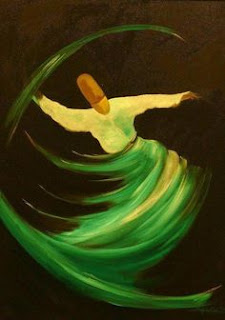Birdwings
1
Your grief for what you've lost lifts a mirror
up to where you're bravely working.
2
Expecting the worst, you look, and instead,
here's the joyful face you've been wanting to see.
3
Your hand opens and closes and opens and closes.
If it were always a fist or always stretched open,
you would be paralyzed.
4
Your deepest presence
is in every small contracting and expanding,
the two as beautifully balanced and coordinated
as birdwings.

This is one of Rumi's most profound verses, thus far. It holds the key to the understanding of what we are, what we are capable of and where we're headed. Many thanks to my friend and co-author, Mahesh for leading me towards a deeper understanding of this verse.
Let's begin with the first two lines:
Your grief for what you've lost lifts a mirror
up to where you're bravely working.
What have we lost? A phone, a pen? Whatever we think we've lost is a measure of ourselves.
What level of loss elicits a deep grief? It is that level that defines our journey through this life and possibly the next. If we grieve for the loss of a material object, then that's one level at which we're bravely working. If we grieve for a lost / broken relationship then that's a slightly higher level at which we're operating and so on.
In Rumi's case, his grief is that he has 'lost' or not attained synchronicity with the Love Principle or the Soul Principle. He is grieving that that blissful union isn't taking place. He is bravely working towards the attainment of this higher experience that most other mortals would not even consider, especially in the prime of their lives.
So, here's an important lesson for each one of us to consider:
"What will make me feel complete?"
Having understood that, let's move on to the second section:
Expecting the worst, you look, and instead,
here's the joyful face you've been wanting to see.
When you least expect something that you've been working for, it comes to you. When we are trying to achieve something, especially a spiritual experience, we're putting ourselves into that effort. And the self that we put into the effort is our ego. When we let go of that ego and consequently of 'my effort', we find that we are given what we were trying to achieve. The grief that Rumi talks about in section 1 is the effort that is not (yet) resulting in anything. The outcome is supposed to make us feel complete.
The 'joyful face' that we can see, the one that we have been wanting to see, is the Soul Principle.
Finally, when it comes to achieving something, anything, whether you put in effort or no effort, you require Grace. The Universe must deliver to you the achievement of your goal so that you can move on to the next level of 'grief'. This is what is destiny. This Force is beyond any of us. It's like we're waiting at the door, but He has to open the door. And the more 'you' don't exist, the chances of the door opening go up.
The lesson for us:
"Am I being arrogant in assuming that only my effort help me succeed or fail?"
The third section:
Your hand opens and closes and opens and closes.
If it were always a fist or always stretched open, you would be paralyzed.
The hand in a fist is your effort. The hand opening up is you not-trying (no-effort) and being ready to receive Grace. If you always sit ready to receive without putting in any effort, you are as good as dead or paralyzed; you are not taking part in the process of life, of growth.
And, the fourth and final section:
Your deepest presence is in every small contracting and expanding,
the two as beautifully balanced and coordinated as birdwings.
'Your deepest presence' refers to our full, aware self in this process of effort and no-effort. We need to be aware of this process and allow ourselves to participate in it deeply because when we do so, we can experience a sense of balance and harmony like the wings of a butterfly (birdwings).


